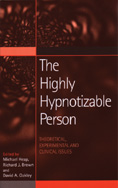2. The Importance of Context
Written on Sept 1, 2025
It seems to me that a much overlooked, but crucial, aspect of hypnosis is the context in which it is being used.
For most of my career as a clinical, forensic and academic psychologist was involved in various ways with hypnosis and matters relating to it (although this did not form the main part of my work). Experience has taught me something that is rarely alluded to in any discourse on the nature of hypnosis but is of crucial significance in accounting for the totality of the hypnotic subject's experience - what we observe of their reactions and their account of their subjective experiences. This crucial factor is the context in which hypnosis is taking place. (Sometimes it is not essential to explicitly refer to this, but it should always be born in mind.)
There are several contexts or settings in which hypnosis is used. The most common one is probably the clinical - treating people with psychological and, in appropriate cases, medical problems. A second important one is the research context. In this blog, I am focusing on experimental research, usually undertaken by psychologists in university laboratories. Another context is the stage, where hypnosis is used for entertainment purposes. There is also the educational context - lecturing on hypnosis and training others to use it in their professional work, when demonstrations of hypnosis are often given using volunteers from the audience and, for training purposes, practical sessions. In the past (though no longer, owing to doubts about efficacy and reliability) hypnosis has been used in the interrogation of witnesses and victims in criminal cases. Directly or indirectly, I am familiar with the application of hypnosis in all these contexts in my clinical and forensic practice and in teaching and training.
In addition to the above, there is of course what we might call the general context, namely hypnosis itself. That is, the hypnotic subject comes to the session with ideas and expectations about what hypnosis involves, what is required of them, what the experience will be like, how they interpret these experiences, and so on. Importantly, different subjects have different preconceptions and expectations, and we may include the individual's psychological make-up.
What we may call the local context is, as I have outlined above, the clinic, the laboratory, the stage, and so on. Important again are the subject's general psychological characteristics and his or her expectations, but here I am referring not to their prior understanding and expectations about hypnosis but the context in which it is taking place, what will be happening and what is expected of them (as patient, laboratory subject, stage performer, and so on) regardless of hypnosis.
It follows that it is a fundamental mistake to assume that what we observe and conclude about hypnosis in one of these contexts generalises to any of the other contexts. It can't. Yet this mistake is made repeatedly, even by the most respected writers in this field.
I shall illustrate what I mean in the blogs to follow. For this purpose, I shall draw on my professional experience, including my work providing expert opinions in civil and criminal cases where it is alleged that hypnosis was used by the defendant.
Future reflections: Followers of this blog may like to consider how the hypnotic subject's experiences and behaviour are modified in each of the contexts described.
Note: At present, it's not possible for you to post your comments on my blog directly. But I welcome them via my email address, and I'll only upload them under 'Comments' if that is your wish (and with the usual stipulations about offensiveness, etc.)




